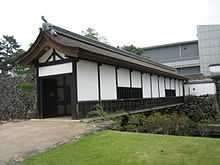Funai Domain

Funai Domain (府内藩 Funai-han) was a Japanese domain of the Edo period. It is associated with Bungo Province in present-day Ōita Prefecture on the island of Kyushu.
In the han system, Funai was a political and economic abstraction based on periodic cadastral surveys and projected agricultural yields.[1] In other words, the domain was defined in terms of kokudaka, not land area.[2] This was different from the feudalism of the West.
History
Funai had been the castle of the Ōtomo clan; however, Toyotomi confiscated it during the lordship of Ōtomo Yoshimune. In 1600, Takenaka Shigetoshi, the cousin of Takenaka Shigeharu (Hanbei), received Funai Castle, and land rated at 20,000 koku; he had switched sides during the Sekigahara Campaign to support Tokugawa Ieyasu. The domain was then given to Hineno Yoshiakira in 1634; however, as he died heirless, the domain was given to the Matsudaira (Ogyū) clan. The Matsudaira clan remained lords of Funai until the Meiji Restoration.
List of daimyo
The hereditary daimyo were head of the clan and head of the domain.
- Takenaka clan, 1603-1634 (Tozama; 20,000 koku)
- Shigetoshi (cousin of Takenaka Hanbei)
- Shigeyoshi
- Hineno clan, 1634-1656 (Tozama; 20,000 koku)
- Yoshiakira
- Matsudaira (Ogyū) clan, 1656-1871 (Fudai; 21,000 koku)
- Tadaaki
- Chikanobu
- Chikayoshi
- Chikasada
- Chikanori
- Chikatomo
- Chikayoshi
- Chikakuni
- Chikanobu
- Chikayoshi
See also
References

- ↑ Mass, Jeffrey P. and William B. Hauser. (1987). The Bakufu in Japanese History, p. 150.
- ↑ Elison, George and Bardwell L. Smith (1987). Warlords, Artists, & Commoners: Japan in the Sixteenth Century, p. 18.
External links
![]() Media related to Funai Castle at Wikimedia Commons
Media related to Funai Castle at Wikimedia Commons
- (Japanese) Funai Domain on "Edo 300 HTML" (16 Sept. 2007)
- (Japanese) Pictures of the remains of Funai Castle